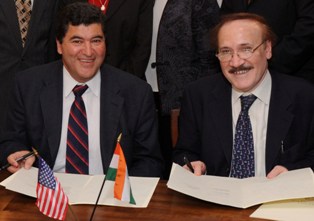NIH Strengthens Research Collaborations Between US and India
March - April, 2008 | Volume 7, Issue 2

NIH Director Dr. Zerhouni and India's Dr. Bhan signed
an agreement to collaborate on mental health,
neurological and addictive disorders research.
The NIH has agreed to strengthen its research collaborations with India in the areas of mental health and neurological and addictive disorders. In addition, India has committed to establishing long-term career paths for its scientists by facilitating their return to appropriate research positions following NIH fellowships. The subjects were discussed in a recent meeting between NIH Director Dr. Elias Zerhouni and Dr. Raj Bhan, India's Secretary to the Department of Biotechnology (DBT).
The topics are critical for India, as these diseases have taken a substantial social and economic toll in the South Asia region. Despite India's status as a pioneer country in health care planning, mental health has traditionally been a lesser priority, according to the International Review of Psychiatry. Both Dr. Zerhouni and Dr. Bhan expressed optimism that inroads can be made in these areas through increased teamwork.
"These alliances create rare opportunities for breakthroughs, not only because of the champion scientists involved, but through shared risk and shared rewards," said Dr. Zerhouni. "Our international partnerships are better now than any other time in history."
Dr. Bhan also met with Fogarty Director Dr. Roger I. Glass and the directors of the National Institute of Mental Health, the National Institute of Neurological Disorders and Stroke, the National Eye Institute, and the National Institute on Drug Abuse.
Discussion topics included specific research areas such as small molecule screening and population genetics. The consensus view was that the NIH Blueprint for Neuroscience Research would be the best starting point for defining a joint research agenda.
"This is very encouraging," said Dr. Glass, who moderated the meeting. "There is a real incentive for working together when you have twice the resources." He cited the Indo-U.S. Vaccine Action Program, which was established in 1987 and renewed in May 2007, as one example of a highly successful joint venture between the two nations.
Immediately following the meeting, two new Indo-U.S. agreements were signed by Dr. Zerhouni and Dr. Bhan, the first of which was a Joint Statement on Research Related to Mental Health, Neurology and Addictive Disorders, which covered a wide range of topics, including genetic testing and mapping of brain disease and disorders, animal models for collaborative research, advanced brain-imaging technologies and increased bilateral collaboration on new therapeutics and biologicals.
"We are very interested in partnering in these areas," said Dr. Bhan. "U.S. science is a huge enterprise, and India has a large, publicly-funded research community as well--now it is just a question of moving forward."
The second agreement was a Letter of Intent to establish long-term career paths for Indian scientists of exceptional scientific ability, as well as continued long-term scientific collaborations with their NIH mentors after they have completed their training and returned to India.
DBT, which Dr. Bhan has led since 2004, is one of NIH's most important partner institutions within India. NIH has a long history of collaboration with India, both through intramural and extramural activities. NIH has provided funding to over 175 research projects in India, supporting research on HIV/AIDS, tuberculosis, malaria, rotavirus, cancer and other diseases. Additionally, India ranks among the top five countries in terms of number of foreign researchers on the NIH campus.
To view Adobe PDF files,
download current, free accessible plug-ins from Adobe's website.
Related World Regions / Countries